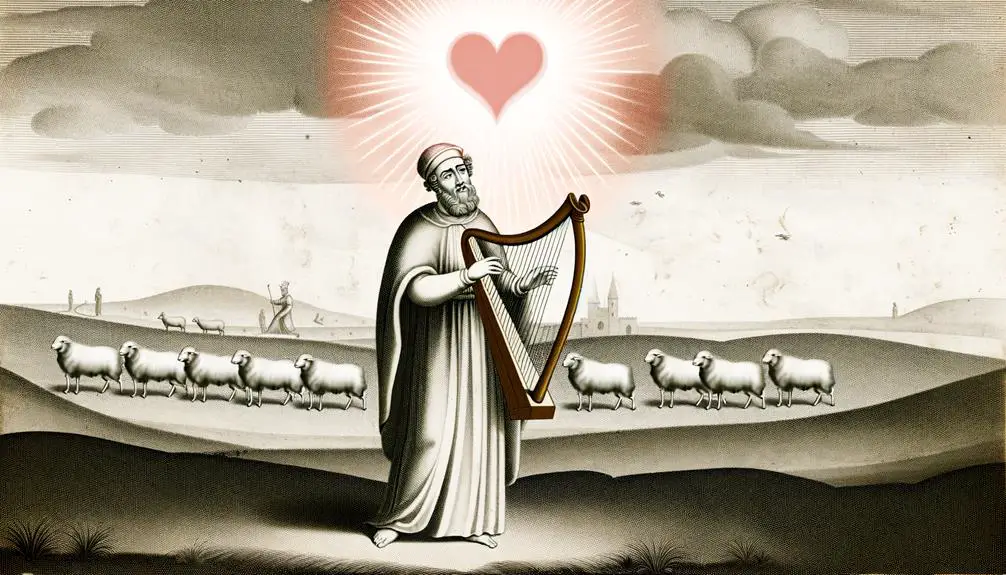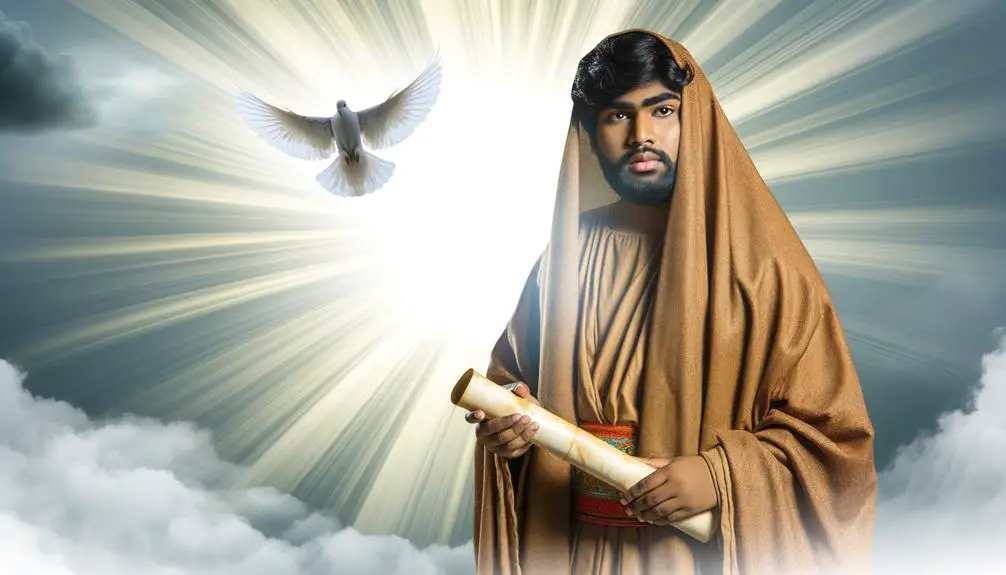Who are the biblical figures that shaped faith, and why do their stories matter today? Discover their timeless lessons in resilience and redemption.

Most Important People in the Bible
As you scroll through your digital Bible app, you can't help but wonder who the VIPs of the biblical narrative really are. From Adam and Eve, the original trendsetters of humanity, to Jesus Christ, the cornerstone of Christian faith, these figures have shaped the spiritual landscape for billions.
Each character, whether a king, prophet, or commoner, plays a pivotal role in this ancient saga of faith, fall, and redemption. So, why should you care about these historical icons? Their stories are not just ancient texts; they are lessons in resilience, leadership, and faith that still resonate today.
Let's uncover what makes them indispensable to understanding the Bible's message.
Key Takeaways
- Adam and Eve set the stage for humanity's moral journey and the concept of sin and redemption.
- Moses and King David were pivotal in shaping the moral and ethical foundations of Western civilization.
- Prophet Isaiah and other prophets emphasized social justice, mercy, and the coming of a Redeemer.
- Jesus Christ stands at the heart of Christianity, embodying divine love, offering salvation, and influencing global ethics and morality.
Adam and Eve: Humanity's Origin

At the dawn of humanity, according to biblical accounts, Adam and Eve stand as the first humans, whose actions set the stage for the rest of human history. Positioned in the Garden of Eden, they're granted freedom with a single prohibition: not to eat from the Tree of Knowledge of Good and Evil. This narrative introduces the concept of the Garden temptation, a pivotal moment that not only tests their obedience but also encapsulates the essence of human free will.
The Garden temptation isn't just a test of will; it's the genesis of Original sin, an act that fundamentally alters the trajectory of humanity. When you delve into the implications of their choice, it's clear that this isn't merely about disobedience but about the awakening to moral consciousness. This event marks humanity's transition from a state of innocence to one of moral awareness, bringing with it the burdens of guilt, shame, and mortality.
Understanding Original sin requires you to grasp its dual nature. It's both a specific act of disobedience and a symbolic representation of the human propensity to err. This concept is crucial because it lays the foundation for the biblical narrative of redemption. The repercussions of this act echo through generations, influencing not just theological perspectives but also shaping the moral and ethical frameworks of societies.
Analyzing the story of Adam and Eve, and particularly the Garden temptation and Original sin, provides you with a nuanced understanding of these foundational biblical figures. Their story isn't just a tale of fallibility; it's a reflection on the complexities of human nature and the perpetual struggle between obedience and transgression.
Moses: Deliverer of the Law

Moving from the foundation of humanity's moral consciousness in the Garden of Eden, we now explore the role of Moses, who emerges as a pivotal figure in shaping the ethical and legal framework of society through the delivery of the Law. Moses' leadership is a testament to his remarkable ability to guide and shape a nation's destiny. His story isn't just one of spiritual significance but also of profound political and social impact.
The escape from Egypt under Moses' guidance is a narrative rich in themes of liberation, faith, and divine intervention. This event, known as the Exodus, is pivotal, not just for its historical implications but for setting the stage for the reception of the Law at Mount Sinai. Here, Moses doesn't just lead his people out of physical bondage but also into a covenant relationship with God, marked by the given Law that would define their societal and moral fabric.
Moses' role as the deliverer of the Law is critical in understanding the development of ethical monotheism. Through the Law, he establishes a set of moral and ethical guidelines that have influenced not just Jewish society but also the foundations of Western legal and ethical systems. The Ten Commandments, as part of this Law, continue to resonate as a moral compass for many.
Through Moses' leadership and the monumental Egypt escape, we witness the transformation of a group of enslaved people into a nation bound by a divine covenant. Moses, therefore, stands not just as a religious figure but as a foundational character in the narrative of human civilization, illustrating the enduring power of faith, law, and leadership.
King David: A Man After God's Heart

Why does King David hold a unique place in biblical history as a man described as being after God's own heart? His story, embroiled in both triumph and tragedy, showcases a profound relationship with God, marked by faith, repentance, and poetry that still resonates today. David's legacy is complex, woven through his humble beginnings, his iconic victory in the Goliath battle, and his ascent to become Israel's greatest king.
David's journey from shepherd boy to the anointed king is a testament to God's favor and guidance. His defeat of Goliath, armed with little more than faith and a sling, isn't just an underdog story; it's a pivotal moment that demonstrates God's power through those who trust in Him. This victory was more than just a physical triumph; it was a spiritual marker that underscored David's reliance on God above all else.
Yet, David's life was far from perfect. His moral failures and personal struggles are laid bare in the scriptures, presenting him as a deeply flawed individual. However, it's his earnest repentance and heartfelt pleas for forgiveness that underscore his designation as a man after God's own heart. Unlike many, David didn't hide his failings but brought them before God, seeking mercy and restoration.
David's contributions to biblical history extend beyond his reign. His psalms offer a glimpse into his soul, revealing a man of deep faith, profound love for God, and an understanding of human frailty. His legacy, therefore, isn't solely about his victories or failures but about his enduring faith and heartfelt worship amidst life's complexities.
The Prophet Isaiah: Messenger of Redemption

Just as King David's story highlights the complexities of faith and leadership, the Prophet Isaiah's teachings offer profound insights into redemption and the nature of divine messages. You'll find that Isaiah's prophecies are a cornerstone for understanding the broader redemption themes woven throughout the Bible. His messages, filled with both warnings and promises, serve as a bridge between God's justice and mercy.
Isaiah's role as a prophet wasn't just about foretelling events; it was deeply rooted in calling the people of Israel back to a relationship with God. His prophecies often reflect the consequences of turning away from God but always offer a path back, emphasizing God's willingness to forgive and redeem. This focus on redemption is crucial, as it underscores the idea that despite humanity's failure, God's love and mercy remain steadfast.
Analyzing Isaiah's prophecies, you'll notice a recurring theme: the promise of a Redeemer. While we won't delve into the specifics of this figure, it's important to recognize how Isaiah sets the stage for understanding redemption on a grand scale. His visions of peace, justice, and restoration aren't just for his contemporary audience but for all generations.
Isaiah's teachings challenge you to look beyond the immediate judgment to the hope that lies ahead. They remind you that redemption isn't just a personal experience but a cosmic plan, woven into the fabric of history by a God who desires to restore all things. Through Isaiah, you're invited to see the world through a lens of redemption, recognizing that even in the darkest times, the promise of renewal and restoration remains.
Jesus Christ: The Savior

In the narrative of redemption woven through the Bible, Jesus Christ stands at the center as the ultimate Savior, fulfilling the ancient prophecies and embodying God's plan for humanity's salvation. His life, chronicled in the New Testament, reveals a mission marked by miraculous healings and parable teachings, each illustrating the depth of His compassion and the breadth of His wisdom. Through His actions and words, you're shown a path that intertwines divine love with human experience, offering a blueprint for living in accordance with God's will.
Miraculous healings performed by Jesus, from restoring sight to the blind to curing the incurable, underscore His authority over the physical and spiritual realms. These acts aren't just displays of power but are deeply symbolic, pointing to His role as the healer of humanity's deepest wounds—sin and separation from God. You're invited to see in these miracles a foretaste of the ultimate healing: the restoration of broken relationship with the Creator.
His parable teachings, on the other hand, serve as masterful illustrations of moral and spiritual truths. Through simple stories drawn from everyday life, Jesus conveys complex realities about the Kingdom of God, justice, love, and forgiveness. You're challenged to rethink your values and priorities, aligning them more closely with the divine perspective.
In analyzing Jesus' life and teachings, you find not only the heart of the Christian faith but also a revolutionary guide for personal transformation and social renewal. His message transcends time, urging you to embrace a love that sacrifices, forgives, and unites, embodying the hope of redemption for all.
Frequently Asked Questions
How Did the Roles of Women in Biblical Narratives Influence Early Christian Communities and Their Views on Gender Roles?
The roles of women in biblical narratives significantly influenced early Christian communities and their views on gender roles. Feminist reinterpretations have highlighted how women's leadership roles were pivotal, yet often understated.
In What Ways Did the Political and Social Contexts of the Times These Biblical Figures Lived in Shape Their Stories and the Lessons Drawn From Them?
You'll find it fascinating that 75% of historical leaders' decisions were influenced by their era's political and social climates. This cultural influence analysis reveals how the stories you've heard were shaped significantly by their times, showcasing leadership style evolution in response to these pressures.
Such an objective look offers a deeper understanding of how cultural and political contexts have historically molded leadership narratives, guiding the lessons we draw from them today.
How Have Interpretations of These Key Biblical Figures Differed Among Various Christian Denominations and Jewish Traditions Throughout History?
You've noticed that interpretations of key figures have varied across Christian denominations and Jewish traditions. This diversity is rooted in comparative theology and enriched through interfaith dialogue.
Each tradition brings unique perspectives, shaped by their doctrinal beliefs, historical contexts, and cultural backgrounds. This variance highlights the depth of these figures' impacts and encourages a broader understanding.
Analyzing these differences objectively, you gain insights into the evolving nature of religious thought and practice.
Aside From These Figures, Who Are Considered the Unsung Heroes of the Bible, and What Impact Did They Have on the Development of Biblical Themes and Moral Teachings?
Imagine a tapestry woven with threads unseen, representing the unsung heroes of the Bible. Their stories, often overshadowed, are pivotal due to miraculous interventions and cultural adaptations.
These figures, like Jael, Deborah, or Barnabas, played crucial roles in the development of biblical themes and moral teachings. Their actions, though not as celebrated, underscore the dynamic interplay of faith, courage, and resilience, shaping the narrative landscape and enriching its spiritual and ethical dimensions.
How Do Modern Archaeological Discoveries and Historical Research Challenge or Support the Traditional Accounts of These Pivotal Individuals in the Bible?
You're navigating how modern archaeological discoveries—like genetic evidence and architectural findings—either challenge or support traditional narratives.
These discoveries offer a unique lens, scrutinizing historical accounts versus tangible evidence. Genetic evidence often reveals surprising connections or origins, while architectural findings can affirm or question the existence and lifestyles of key figures.
Your analysis doesn't just recount tales; it delves into the authenticity and complexities of historical narratives, bridging past with present understanding.
Conclusion
In conclusion, understanding the roles of pivotal figures in the Bible, like Moses, who led the Israelites out of Egypt, offers profound insights into faith, morality, and human nature.
Take, for example, a modern leader advocating for social justice; they often draw inspiration from Moses' courage and determination.
Analyzing these biblical characters not only deepens one's spiritual knowledge but also highlights enduring lessons on leadership, resilience, and redemption that are relevant across ages and cultures.



Sign up